外研版(2019)选择性必修第二册 Unit4 Breaking boundaries Starting out and Understanding ideas 名师教学设计
文档属性
| 名称 | 外研版(2019)选择性必修第二册 Unit4 Breaking boundaries Starting out and Understanding ideas 名师教学设计 | 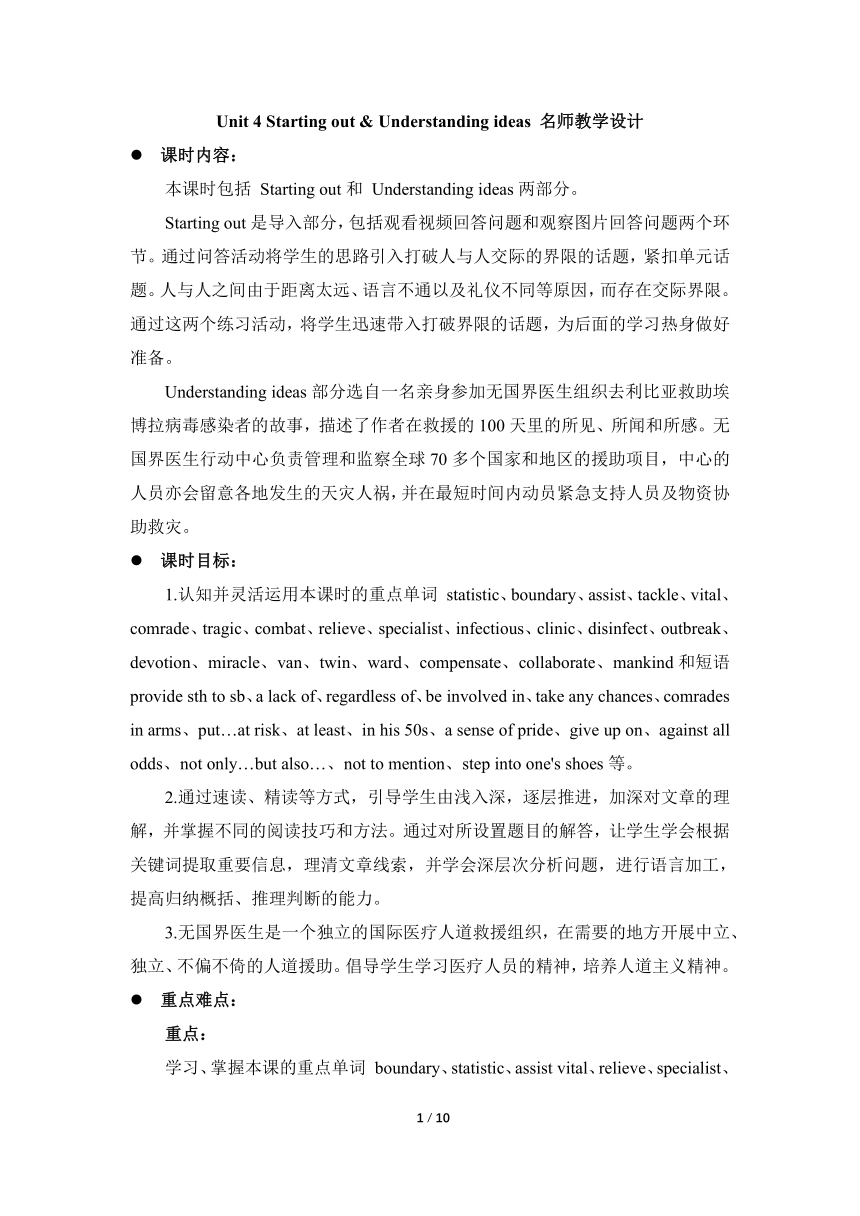 | |
| 格式 | docx | ||
| 文件大小 | 189.6KB | ||
| 资源类型 | 教案 | ||
| 版本资源 | 外研版(2019) | ||
| 科目 | 英语 | ||
| 更新时间 | 2023-03-03 22:49:21 | ||
图片预览

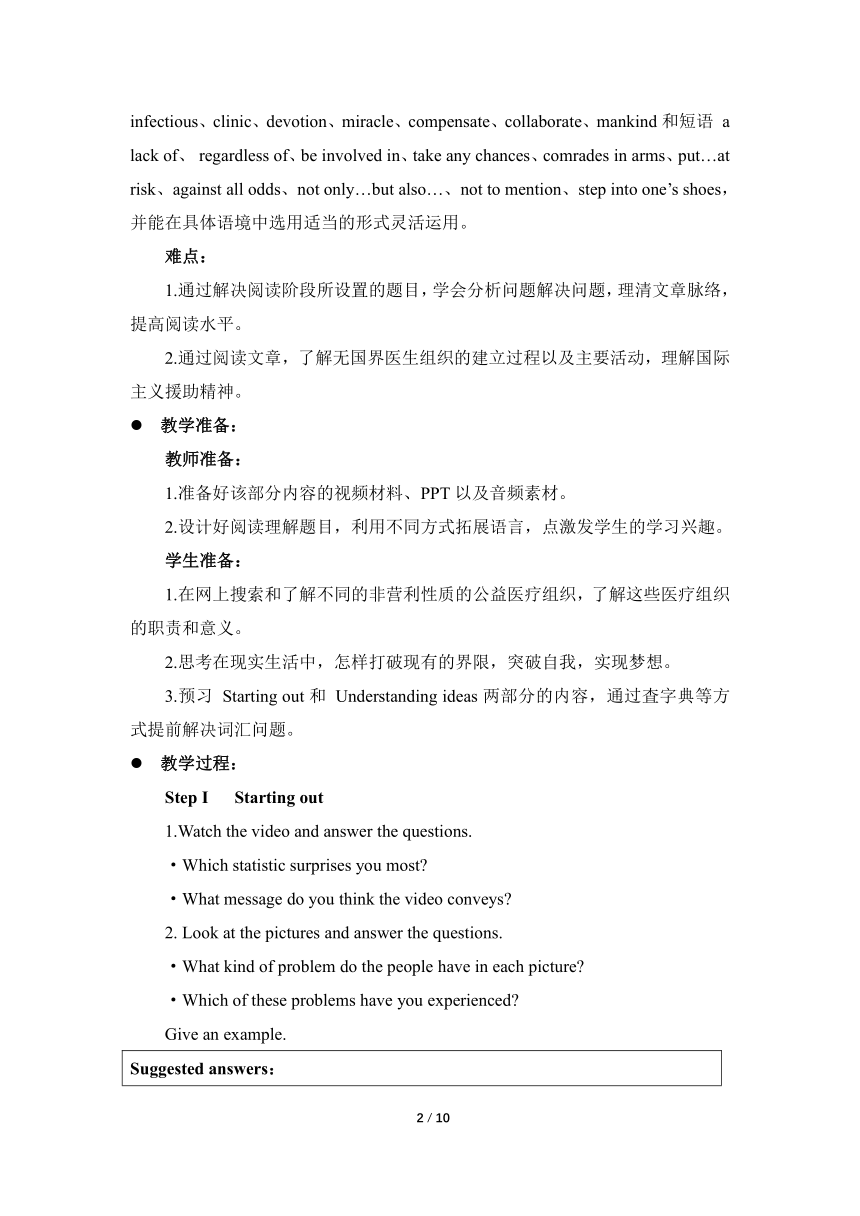
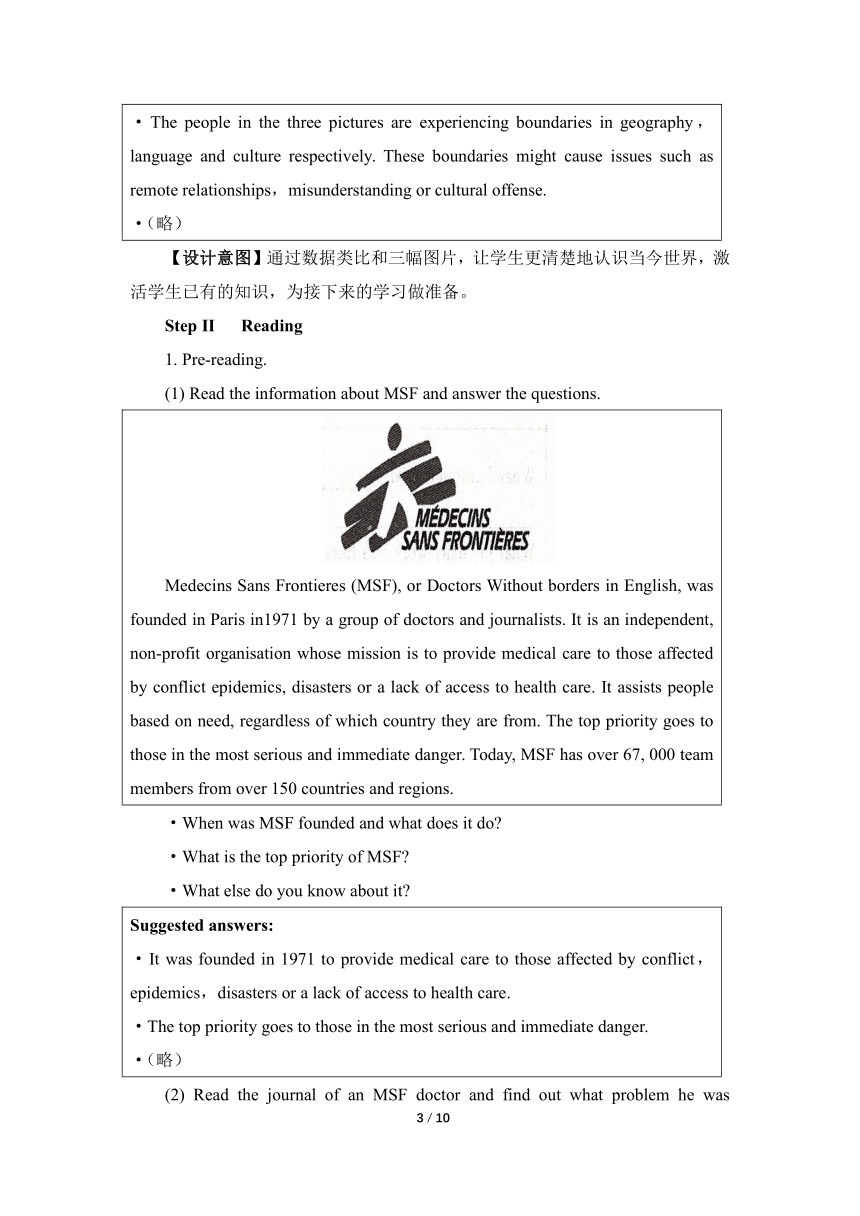
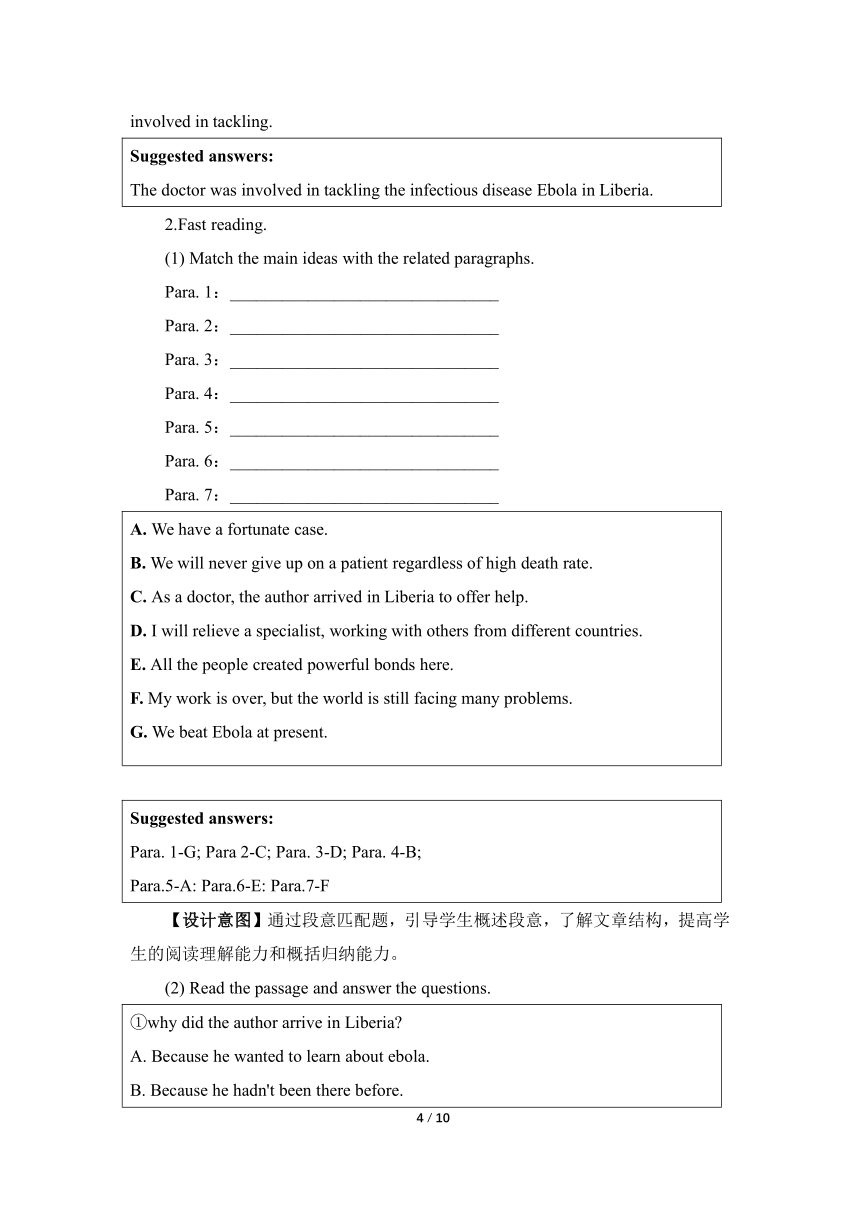
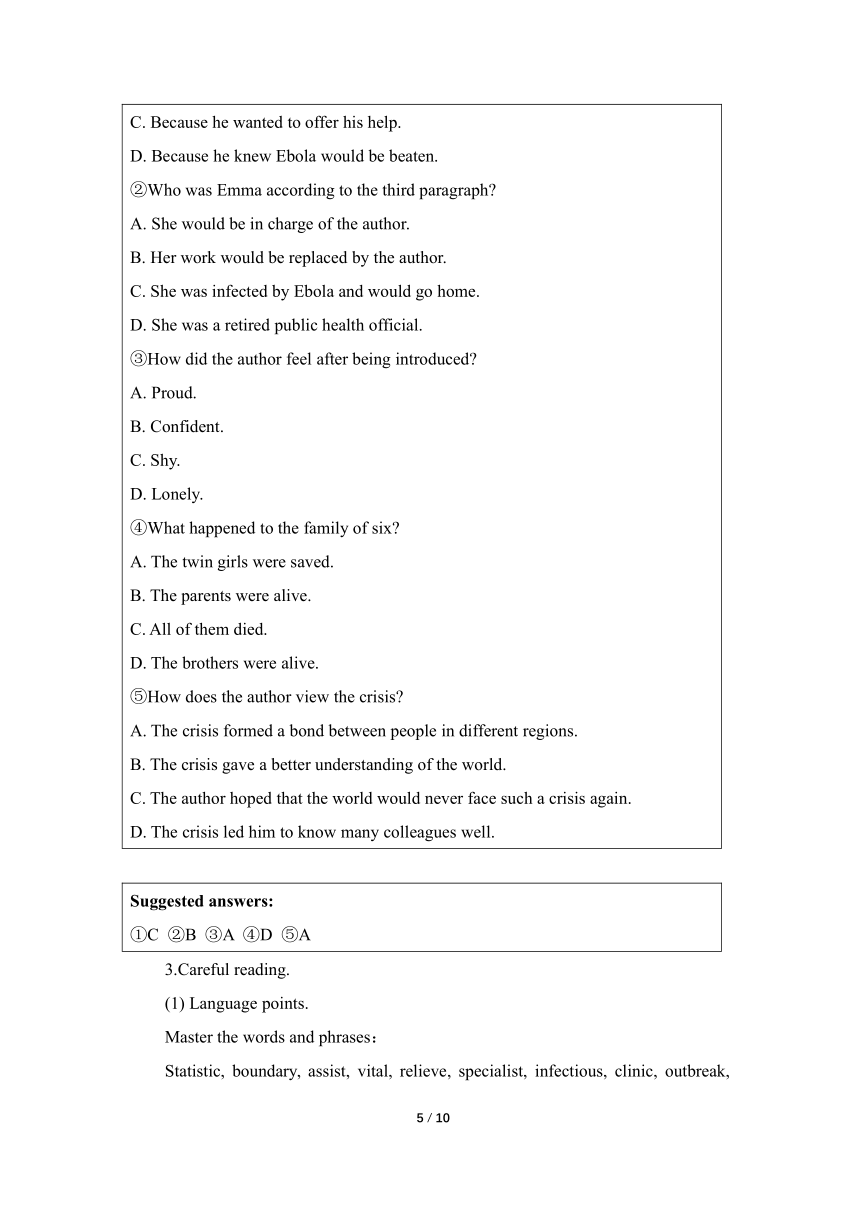
文档简介
Unit 4 Starting out & Understanding ideas 名师教学设计
课时内容:
本课时包括 Starting out和 Understanding ideas两部分。
Starting out是导入部分,包括观看视频回答问题和观察图片回答问题两个环节。通过问答活动将学生的思路引入打破人与人交际的界限的话题,紧扣单元话题。人与人之间由于距离太远、语言不通以及礼仪不同等原因,而存在交际界限。通过这两个练习活动,将学生迅速带入打破界限的话题,为后面的学习热身做好准备。
Understanding ideas部分选自一名亲身参加无国界医生组织去利比亚救助埃博拉病毒感染者的故事,描述了作者在救援的100天里的所见、所闻和所感。无国界医生行动中心负责管理和监察全球70多个国家和地区的援助项目,中心的人员亦会留意各地发生的天灾人祸,并在最短时间内动员紧急支持人员及物资协助救灾。
课时目标:
1.认知并灵活运用本课时的重点单词 statistic、boundary、assist、tackle、vital、comrade、tragic、combat、relieve、specialist、infectious、clinic、disinfect、outbreak、devotion、miracle、van、twin、ward、compensate、collaborate、mankind和短语 provide sth to sb、a lack of、regardless of、be involved in、take any chances、comrades in arms、put…at risk、at least、in his 50s、a sense of pride、give up on、against all odds、not only…but also…、not to mention、step into one's shoes等。
2.通过速读、精读等方式,引导学生由浅入深,逐层推进,加深对文章的理解,并掌握不同的阅读技巧和方法。通过对所设置题目的解答,让学生学会根据关键词提取重要信息,理清文章线索,并学会深层次分析问题,进行语言加工,提高归纳概括、推理判断的能力。
3.无国界医生是一个独立的国际医疗人道救援组织,在需要的地方开展中立、独立、不偏不倚的人道援助。倡导学生学习医疗人员的精神,培养人道主义精神。
重点难点:
重点:
学习、掌握本课的重点单词 boundary、statistic、assist vital、relieve、specialist、infectious、clinic、devotion、miracle、compensate、collaborate、mankind和短语 a lack of、 regardless of、be involved in、take any chances、comrades in arms、put…at risk、against all odds、not only…but also…、not to mention、step into one’s shoes,并能在具体语境中选用适当的形式灵活运用。
难点:
1.通过解决阅读阶段所设置的题目,学会分析问题解决问题,理清文章脉络,提高阅读水平。
2.通过阅读文章,了解无国界医生组织的建立过程以及主要活动,理解国际主义援助精神。
教学准备:
教师准备:
1.准备好该部分内容的视频材料、PPT以及音频素材。
2.设计好阅读理解题目,利用不同方式拓展语言,点激发学生的学习兴趣。
学生准备:
1.在网上搜索和了解不同的非营利性质的公益医疗组织,了解这些医疗组织的职责和意义。
2.思考在现实生活中,怎样打破现有的界限,突破自我,实现梦想。
3.预习 Starting out和 Understanding ideas两部分的内容,通过査字典等方式提前解决词汇问题。
教学过程:
Step I Starting out
1.Watch the video and answer the questions.
·Which statistic surprises you most
·What message do you think the video conveys
2. Look at the pictures and answer the questions.
·What kind of problem do the people have in each picture
·Which of these problems have you experienced
Give an example.
Suggested answers: ·The people in the three pictures are experiencing boundaries in geography,language and culture respectively. These boundaries might cause issues such as remote relationships,misunderstanding or cultural offense. ·(略)
【设计意图】通过数据类比和三幅图片,让学生更清楚地认识当今世界,激活学生已有的知识,为接下来的学习做准备。
Step Ⅱ Reading
1. Pre-reading.
(1) Read the information about MSF and answer the questions.
Medecins Sans Frontieres (MSF), or Doctors Without borders in English, was founded in Paris in1971 by a group of doctors and journalists. It is an independent, non-profit organisation whose mission is to provide medical care to those affected by conflict epidemics, disasters or a lack of access to health care. It assists people based on need, regardless of which country they are from. The top priority goes to those in the most serious and immediate danger. Today, MSF has over 67, 000 team members from over 150 countries and regions.
·When was MSF founded and what does it do
·What is the top priority of MSF
·What else do you know about it
Suggested answers: ·It was founded in 1971 to provide medical care to those affected by conflict,epidemics,disasters or a lack of access to health care. ·The top priority goes to those in the most serious and immediate danger. ·(略)
(2) Read the journal of an MSF doctor and find out what problem he was involved in tackling.
Suggested answers: The doctor was involved in tackling the infectious disease Ebola in Liberia.
2.Fast reading.
(1) Match the main ideas with the related paragraphs.
Para. 1:_______________________________
Para. 2:_______________________________
Para. 3:_______________________________
Para. 4:_______________________________
Para. 5:_______________________________
Para. 6:_______________________________
Para. 7:_______________________________
A. We have a fortunate case. B. We will never give up on a patient regardless of high death rate. C. As a doctor, the author arrived in Liberia to offer help. D. I will relieve a specialist, working with others from different countries. E. All the people created powerful bonds here. F. My work is over, but the world is still facing many problems. G. We beat Ebola at present.
Suggested answers: Para. 1-G; Para 2-C; Para. 3-D; Para. 4-B; Para.5-A: Para.6-E: Para.7-F
【设计意图】通过段意匹配题,引导学生概述段意,了解文章结构,提高学生的阅读理解能力和概括归纳能力。
(2) Read the passage and answer the questions.
①why did the author arrive in Liberia A. Because he wanted to learn about ebola. B. Because he hadn't been there before. C. Because he wanted to offer his help. D. Because he knew Ebola would be beaten. ②Who was Emma according to the third paragraph A. She would be in charge of the author. B. Her work would be replaced by the author. C. She was infected by Ebola and would go home. D. She was a retired public health official. ③How did the author feel after being introduced A. Proud. B. Confident. C. Shy. D. Lonely. ④What happened to the family of six A. The twin girls were saved. B. The parents were alive. C. All of them died. D. The brothers were alive. ⑤How does the author view the crisis A. The crisis formed a bond between people in different regions. B. The crisis gave a better understanding of the world. C. The author hoped that the world would never face such a crisis again. D. The crisis led him to know many colleagues well.
Suggested answers: ①C ②B ③A ④D ⑤A
3.Careful reading.
(1) Language points.
Master the words and phrases:
Statistic, boundary, assist, vital, relieve, specialist, infectious, clinic, outbreak, devotion,miracle,compensate,collaborate,mankind,a lack of,regardless of,be involved in,take any chances,comrades in arms,put...at risk against all odds,not only…but also…,not to mention,step into one’s shoes.
【备注】词汇知识点讲解详见第二教案“新知探究”。
(2) Read the passage again and retell it.
【设计意图】通过设置该题,进一步归纳、概括文章,理清文章脉络,有助于学生加深对文章的理解,同时,在读懂语篇的基础上,将英语语法、句法、词汇知识融合在一起,更科学地反映学生的口头表达能力和英语综合程度。
4. Post-reading.
(1) Do activity 3 on Page 40.
Choose the ideas conveyed in the passage and find evidence to support your choices.
①It is not the first time the author has worked with MSF. ②The work with MSF in Liberia is life-threatening. ③The author enjoyed working together with all his colleagues. ④The author always felt frustrated with the high death rate.
Suggested answers: ②③
Now use five adjectives to describe the spirit of MSF doctors and give your reasons.
【设计意图】该活动要求选择文章所传达的内容,并在文中找出证据支持。这类题目属于推理判断题,要做好这类题型需从整体上把握语篇内容,在语篇的表面意义与隐含意义、已知信息与未知信息间架起桥梁,透过字里行间去体会作者的“弦外之音”。在阅读文章中,作者常常让读者领会文章中不明确表达出来而暗含在其中的意思。这就需要读者在阅读过程中,在全面掌握文章所给出的信息的基础上,运用自已的知识认真思考问题和领会作者的言外之意。这种从“已知”推出“未知”的过程就是推论,是阅读过程中必须掌握的一种解题技巧。
(2) Do Activity 4 on Page 40.
① Organise information from the passage and complete the table.
Time Experience Feeling
Before arrival How I made up my mind: ________ _______________________________
My 100 days What I did on arrival: ________ _______________________________ What my daily work was like: __ ______________________________ An unforgettable case: ________ _______________________________
Now What is special about today: __ _______________________________ What we are doing:____________ _______________________________
Suggested answers: Time: Before arrival Experiences: ·How I made up my mind: I saw the tragic scenes on the news and I felt it was my duty as a doctor to go there and offer my help. Feelings: with strong sense of mission Time My 100 days Experiences: ·What I did on arrival: I got to know the daily routine and my colleagues and started my work. ·What my daily work was like: Together with the others working for or alongside MSF, I helped those who were infected with the terrible disease Ebola, We worked together, surrounded by blood, vomit and death. ·An unforgettable case: Two young brothers survived the disease after their family members had died. Feelings: proud, hopeful, amazed Time: Now Experiences: ·What is special about today: We celebrated because it's exactly one month since the last reported case, and my time is almost up. ·What we are doing: We are collaborating to create a global community with a shared future of peace and prosperity. Feelings: happy, inspired, proud, hopeful
②Now read the information and answer the questions.
We call on the people of all countries to work together to build a community with a shared future for mankind, to build an open, inclusive, clean, and beautiful world that enjoys lasting peace, universal security, and common prosperity. From Xi Jinping's report at the 19th CPC National congress
·What is your understanding of “a community with a shared future for mankind”
·How is the idea reflected in the MSF doctor's journal
Suggested answers: ·(略) ·The author mentioned that Ebola has no respect for borders. This indicates that borders are artificial. Many human differences are similarly artificial or unimportant when compared to what unites people. Doctors and others involved in the fight against the disease were united by their common values of respecting and saving human life.
【设计意图】该活动以填空题的形式,将作者援助利比里亚抗击埃博拉病毒的动机、经历和感受概括出来,有助于学生理清文章主线、获取关键信息。引导学生抓住题目中的关键词,回扣原文,通过原文定位法,找到问题的答案。
Step III Summing up
1.总结本节课的重点单词 statistic、boundary、assist vital、relieve、specialist、infectious、clinic、outbreak、devotion、miracle、compensate、collaborate、mankind和短语a lack of、regardless of、be involved in、take any chances、comrades in arms、put.at risk、against all odds、not only…but also…、not to mention、step into one's shoes及句型,采用表格、思维导图等形式更清晰地了解它们的用法,形成知识脉络。
2.让学生用英语简短地概述作者在援助期间的所见所感,进一步锻炼学生概括、归纳的能力。
3.无国界医生组织是一个自发组成的温暖而强大的团体,向世界上任何有需要的地方伸出援手。他们是“来自异国的上帝助手,贫瘠与战火中的天使”,引导学生体会这种工作的伟大和意义,学会奉献,建立人类命运共同体意识。
Step IV Homework
1. Sum up what we learnt in class and take notes.
2. Preview the next period.
板书设计
Unit 4 Breaking boundaries Period I Starting out Understanding ideas I. Starting out 1. Watch the video and answer the questions. 2. Look at the pictures and answer the questions. Ⅱ. Reading 1. Pre-reading. (1) Read the information about MSF and answer the questions. (2) Read the journal of an MSF doctor and find out what problem he was involved in tackling. 2. Fast reading. (1) Match the main ideas with the related paragraphs. (2) Read the passage and answer the questions. 3. Careful reading. (1) Language points. (2) Read the passage again and retell it. 4. Post-reading. (1) Do Activity 3 on Page 40. (2) Do Activity 4 on Page 40. III. Summing up IV. Homework
2 / 2
课时内容:
本课时包括 Starting out和 Understanding ideas两部分。
Starting out是导入部分,包括观看视频回答问题和观察图片回答问题两个环节。通过问答活动将学生的思路引入打破人与人交际的界限的话题,紧扣单元话题。人与人之间由于距离太远、语言不通以及礼仪不同等原因,而存在交际界限。通过这两个练习活动,将学生迅速带入打破界限的话题,为后面的学习热身做好准备。
Understanding ideas部分选自一名亲身参加无国界医生组织去利比亚救助埃博拉病毒感染者的故事,描述了作者在救援的100天里的所见、所闻和所感。无国界医生行动中心负责管理和监察全球70多个国家和地区的援助项目,中心的人员亦会留意各地发生的天灾人祸,并在最短时间内动员紧急支持人员及物资协助救灾。
课时目标:
1.认知并灵活运用本课时的重点单词 statistic、boundary、assist、tackle、vital、comrade、tragic、combat、relieve、specialist、infectious、clinic、disinfect、outbreak、devotion、miracle、van、twin、ward、compensate、collaborate、mankind和短语 provide sth to sb、a lack of、regardless of、be involved in、take any chances、comrades in arms、put…at risk、at least、in his 50s、a sense of pride、give up on、against all odds、not only…but also…、not to mention、step into one's shoes等。
2.通过速读、精读等方式,引导学生由浅入深,逐层推进,加深对文章的理解,并掌握不同的阅读技巧和方法。通过对所设置题目的解答,让学生学会根据关键词提取重要信息,理清文章线索,并学会深层次分析问题,进行语言加工,提高归纳概括、推理判断的能力。
3.无国界医生是一个独立的国际医疗人道救援组织,在需要的地方开展中立、独立、不偏不倚的人道援助。倡导学生学习医疗人员的精神,培养人道主义精神。
重点难点:
重点:
学习、掌握本课的重点单词 boundary、statistic、assist vital、relieve、specialist、infectious、clinic、devotion、miracle、compensate、collaborate、mankind和短语 a lack of、 regardless of、be involved in、take any chances、comrades in arms、put…at risk、against all odds、not only…but also…、not to mention、step into one’s shoes,并能在具体语境中选用适当的形式灵活运用。
难点:
1.通过解决阅读阶段所设置的题目,学会分析问题解决问题,理清文章脉络,提高阅读水平。
2.通过阅读文章,了解无国界医生组织的建立过程以及主要活动,理解国际主义援助精神。
教学准备:
教师准备:
1.准备好该部分内容的视频材料、PPT以及音频素材。
2.设计好阅读理解题目,利用不同方式拓展语言,点激发学生的学习兴趣。
学生准备:
1.在网上搜索和了解不同的非营利性质的公益医疗组织,了解这些医疗组织的职责和意义。
2.思考在现实生活中,怎样打破现有的界限,突破自我,实现梦想。
3.预习 Starting out和 Understanding ideas两部分的内容,通过査字典等方式提前解决词汇问题。
教学过程:
Step I Starting out
1.Watch the video and answer the questions.
·Which statistic surprises you most
·What message do you think the video conveys
2. Look at the pictures and answer the questions.
·What kind of problem do the people have in each picture
·Which of these problems have you experienced
Give an example.
Suggested answers: ·The people in the three pictures are experiencing boundaries in geography,language and culture respectively. These boundaries might cause issues such as remote relationships,misunderstanding or cultural offense. ·(略)
【设计意图】通过数据类比和三幅图片,让学生更清楚地认识当今世界,激活学生已有的知识,为接下来的学习做准备。
Step Ⅱ Reading
1. Pre-reading.
(1) Read the information about MSF and answer the questions.
Medecins Sans Frontieres (MSF), or Doctors Without borders in English, was founded in Paris in1971 by a group of doctors and journalists. It is an independent, non-profit organisation whose mission is to provide medical care to those affected by conflict epidemics, disasters or a lack of access to health care. It assists people based on need, regardless of which country they are from. The top priority goes to those in the most serious and immediate danger. Today, MSF has over 67, 000 team members from over 150 countries and regions.
·When was MSF founded and what does it do
·What is the top priority of MSF
·What else do you know about it
Suggested answers: ·It was founded in 1971 to provide medical care to those affected by conflict,epidemics,disasters or a lack of access to health care. ·The top priority goes to those in the most serious and immediate danger. ·(略)
(2) Read the journal of an MSF doctor and find out what problem he was involved in tackling.
Suggested answers: The doctor was involved in tackling the infectious disease Ebola in Liberia.
2.Fast reading.
(1) Match the main ideas with the related paragraphs.
Para. 1:_______________________________
Para. 2:_______________________________
Para. 3:_______________________________
Para. 4:_______________________________
Para. 5:_______________________________
Para. 6:_______________________________
Para. 7:_______________________________
A. We have a fortunate case. B. We will never give up on a patient regardless of high death rate. C. As a doctor, the author arrived in Liberia to offer help. D. I will relieve a specialist, working with others from different countries. E. All the people created powerful bonds here. F. My work is over, but the world is still facing many problems. G. We beat Ebola at present.
Suggested answers: Para. 1-G; Para 2-C; Para. 3-D; Para. 4-B; Para.5-A: Para.6-E: Para.7-F
【设计意图】通过段意匹配题,引导学生概述段意,了解文章结构,提高学生的阅读理解能力和概括归纳能力。
(2) Read the passage and answer the questions.
①why did the author arrive in Liberia A. Because he wanted to learn about ebola. B. Because he hadn't been there before. C. Because he wanted to offer his help. D. Because he knew Ebola would be beaten. ②Who was Emma according to the third paragraph A. She would be in charge of the author. B. Her work would be replaced by the author. C. She was infected by Ebola and would go home. D. She was a retired public health official. ③How did the author feel after being introduced A. Proud. B. Confident. C. Shy. D. Lonely. ④What happened to the family of six A. The twin girls were saved. B. The parents were alive. C. All of them died. D. The brothers were alive. ⑤How does the author view the crisis A. The crisis formed a bond between people in different regions. B. The crisis gave a better understanding of the world. C. The author hoped that the world would never face such a crisis again. D. The crisis led him to know many colleagues well.
Suggested answers: ①C ②B ③A ④D ⑤A
3.Careful reading.
(1) Language points.
Master the words and phrases:
Statistic, boundary, assist, vital, relieve, specialist, infectious, clinic, outbreak, devotion,miracle,compensate,collaborate,mankind,a lack of,regardless of,be involved in,take any chances,comrades in arms,put...at risk against all odds,not only…but also…,not to mention,step into one’s shoes.
【备注】词汇知识点讲解详见第二教案“新知探究”。
(2) Read the passage again and retell it.
【设计意图】通过设置该题,进一步归纳、概括文章,理清文章脉络,有助于学生加深对文章的理解,同时,在读懂语篇的基础上,将英语语法、句法、词汇知识融合在一起,更科学地反映学生的口头表达能力和英语综合程度。
4. Post-reading.
(1) Do activity 3 on Page 40.
Choose the ideas conveyed in the passage and find evidence to support your choices.
①It is not the first time the author has worked with MSF. ②The work with MSF in Liberia is life-threatening. ③The author enjoyed working together with all his colleagues. ④The author always felt frustrated with the high death rate.
Suggested answers: ②③
Now use five adjectives to describe the spirit of MSF doctors and give your reasons.
【设计意图】该活动要求选择文章所传达的内容,并在文中找出证据支持。这类题目属于推理判断题,要做好这类题型需从整体上把握语篇内容,在语篇的表面意义与隐含意义、已知信息与未知信息间架起桥梁,透过字里行间去体会作者的“弦外之音”。在阅读文章中,作者常常让读者领会文章中不明确表达出来而暗含在其中的意思。这就需要读者在阅读过程中,在全面掌握文章所给出的信息的基础上,运用自已的知识认真思考问题和领会作者的言外之意。这种从“已知”推出“未知”的过程就是推论,是阅读过程中必须掌握的一种解题技巧。
(2) Do Activity 4 on Page 40.
① Organise information from the passage and complete the table.
Time Experience Feeling
Before arrival How I made up my mind: ________ _______________________________
My 100 days What I did on arrival: ________ _______________________________ What my daily work was like: __ ______________________________ An unforgettable case: ________ _______________________________
Now What is special about today: __ _______________________________ What we are doing:____________ _______________________________
Suggested answers: Time: Before arrival Experiences: ·How I made up my mind: I saw the tragic scenes on the news and I felt it was my duty as a doctor to go there and offer my help. Feelings: with strong sense of mission Time My 100 days Experiences: ·What I did on arrival: I got to know the daily routine and my colleagues and started my work. ·What my daily work was like: Together with the others working for or alongside MSF, I helped those who were infected with the terrible disease Ebola, We worked together, surrounded by blood, vomit and death. ·An unforgettable case: Two young brothers survived the disease after their family members had died. Feelings: proud, hopeful, amazed Time: Now Experiences: ·What is special about today: We celebrated because it's exactly one month since the last reported case, and my time is almost up. ·What we are doing: We are collaborating to create a global community with a shared future of peace and prosperity. Feelings: happy, inspired, proud, hopeful
②Now read the information and answer the questions.
We call on the people of all countries to work together to build a community with a shared future for mankind, to build an open, inclusive, clean, and beautiful world that enjoys lasting peace, universal security, and common prosperity. From Xi Jinping's report at the 19th CPC National congress
·What is your understanding of “a community with a shared future for mankind”
·How is the idea reflected in the MSF doctor's journal
Suggested answers: ·(略) ·The author mentioned that Ebola has no respect for borders. This indicates that borders are artificial. Many human differences are similarly artificial or unimportant when compared to what unites people. Doctors and others involved in the fight against the disease were united by their common values of respecting and saving human life.
【设计意图】该活动以填空题的形式,将作者援助利比里亚抗击埃博拉病毒的动机、经历和感受概括出来,有助于学生理清文章主线、获取关键信息。引导学生抓住题目中的关键词,回扣原文,通过原文定位法,找到问题的答案。
Step III Summing up
1.总结本节课的重点单词 statistic、boundary、assist vital、relieve、specialist、infectious、clinic、outbreak、devotion、miracle、compensate、collaborate、mankind和短语a lack of、regardless of、be involved in、take any chances、comrades in arms、put.at risk、against all odds、not only…but also…、not to mention、step into one's shoes及句型,采用表格、思维导图等形式更清晰地了解它们的用法,形成知识脉络。
2.让学生用英语简短地概述作者在援助期间的所见所感,进一步锻炼学生概括、归纳的能力。
3.无国界医生组织是一个自发组成的温暖而强大的团体,向世界上任何有需要的地方伸出援手。他们是“来自异国的上帝助手,贫瘠与战火中的天使”,引导学生体会这种工作的伟大和意义,学会奉献,建立人类命运共同体意识。
Step IV Homework
1. Sum up what we learnt in class and take notes.
2. Preview the next period.
板书设计
Unit 4 Breaking boundaries Period I Starting out Understanding ideas I. Starting out 1. Watch the video and answer the questions. 2. Look at the pictures and answer the questions. Ⅱ. Reading 1. Pre-reading. (1) Read the information about MSF and answer the questions. (2) Read the journal of an MSF doctor and find out what problem he was involved in tackling. 2. Fast reading. (1) Match the main ideas with the related paragraphs. (2) Read the passage and answer the questions. 3. Careful reading. (1) Language points. (2) Read the passage again and retell it. 4. Post-reading. (1) Do Activity 3 on Page 40. (2) Do Activity 4 on Page 40. III. Summing up IV. Homework
2 / 2
